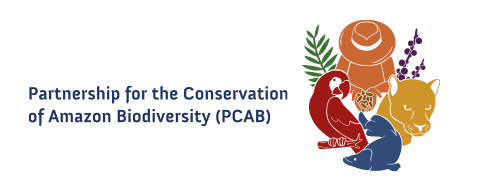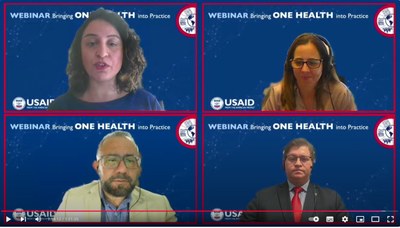Webinar Presents 'One Health' Practices in Brazil, Honduras and Guatemala
December, 2024 – The One Health approach was the central theme of the "Bringing One Health into Practice" webinar, which highlighted USAID-supported strategies and initiatives in Brazil, Honduras, and Guatemala. The event, held on December 6, brought together experts to discuss integrating health surveillance, technical training, and strengthening health systems through multi-stakeholder collaboration. The broadcast received about 400 views.
The projects were presented by USAID representatives from the three countries: Janaína Sallas, Global Health Program Coordinator in Brazil; David Castellanos, Supervisory Project Management Specialist, Office of Global Health Security, Education and Health Development, USAID/Honduras; and Alexandria Schmall, Health Officer, USAID/Guatemala, accompanied by Danilo Alvarez, Global Health Security Advisor.
“For decades, USAID has played a crucial role in promoting global health security. We are committed to strengthening countries to respond effectively to health challenges and threats,” said Catherine Hamlin, Environment Office Director at USAID Brazil. Hamlin emphasized that the One Health approach recognizes the interdependence of human, animal and environmental health, and promotes integrated collaboration with civil society, the private sector, academia and local communities.
Brazil, the largest country in Latin America with a population of 216 million, has established an inter-institutional technical commission to develop a national one-health plan. In this context, USAID is working in nine states of the legal Amazon to strengthen the country's capacity to prevent, detect, and respond to emerging infectious diseases through culturally appropriate and sustainable interventions that meet local needs, including the 25 of 34 The Special Indigenous Health District (DSEI) .
Among the actions highlighted is the signing of an agreement with the Pan American Health Organization (PAHO) with three main objectives: to improve prevention, detection and response to emerging infectious diseases; to strengthen surveillance and laboratory capacity for zoonoses and antimicrobial resistance; and to strengthen public health emergency management and risk reduction strategies. This activity will be launched in January 2025 with the Ministry of Health, Environment and Climate Change and the Ministry of Agriculture, Livestock and Food Supply and PAHO.
Regional perspectives - In his presentation, Castellanos highlighted lessons learned from implementing One Health in Honduras, including the importance of political-economic analysis, multisectoral coordination, and the integration of monitoring, training, and diagnostics to strengthen health systems and ensure long-term resilience.
For Guatemala, Schmall emphasized the importance of fostering dialogue between Western medicine and indigenous health practices, and of involving youth and indigenous leaders. She also emphasized the need to create collaborative spaces for developing and implementing innovative ideas and processes, conducting educational campaigns, and coordinating strategic alliances to strengthen health in an inclusive and culturally sensitive way.
According to Alvarez, Guatemala's efforts to promote One Health solutions are being carried out through data-driven collaboration, including the development of an integrated analytical panel in partnership with the Ministries of Health, Agriculture and Environment, and institutions such as CONAP and INSIVUMEH. This panel aims to improve interoperability and information sharing on priority zoonotic diseases such as avian influenza, leptospirosis, rabies and foodborne diseases, thereby strengthening health information systems.
At the end of the event, Reena Shukla, USAID Health Team Leader for Latin America and the Caribbean, emphasized the importance of identifying and sharing lessons learned across countries.
"We learned a lot about best practices that are being developed. We heard about strengthening laboratory surveillance and diagnostic capacity; the strength of indigenous communities, such as the Mayan worldview in Guatemala; and the use of data to inform decision-making, as well as the potential of biodiversity programs in the Brazilian Amazon, and the integration of gender issues and community engagement. These lessons are fundamental to the development of our evidence-based work," she concluded.



